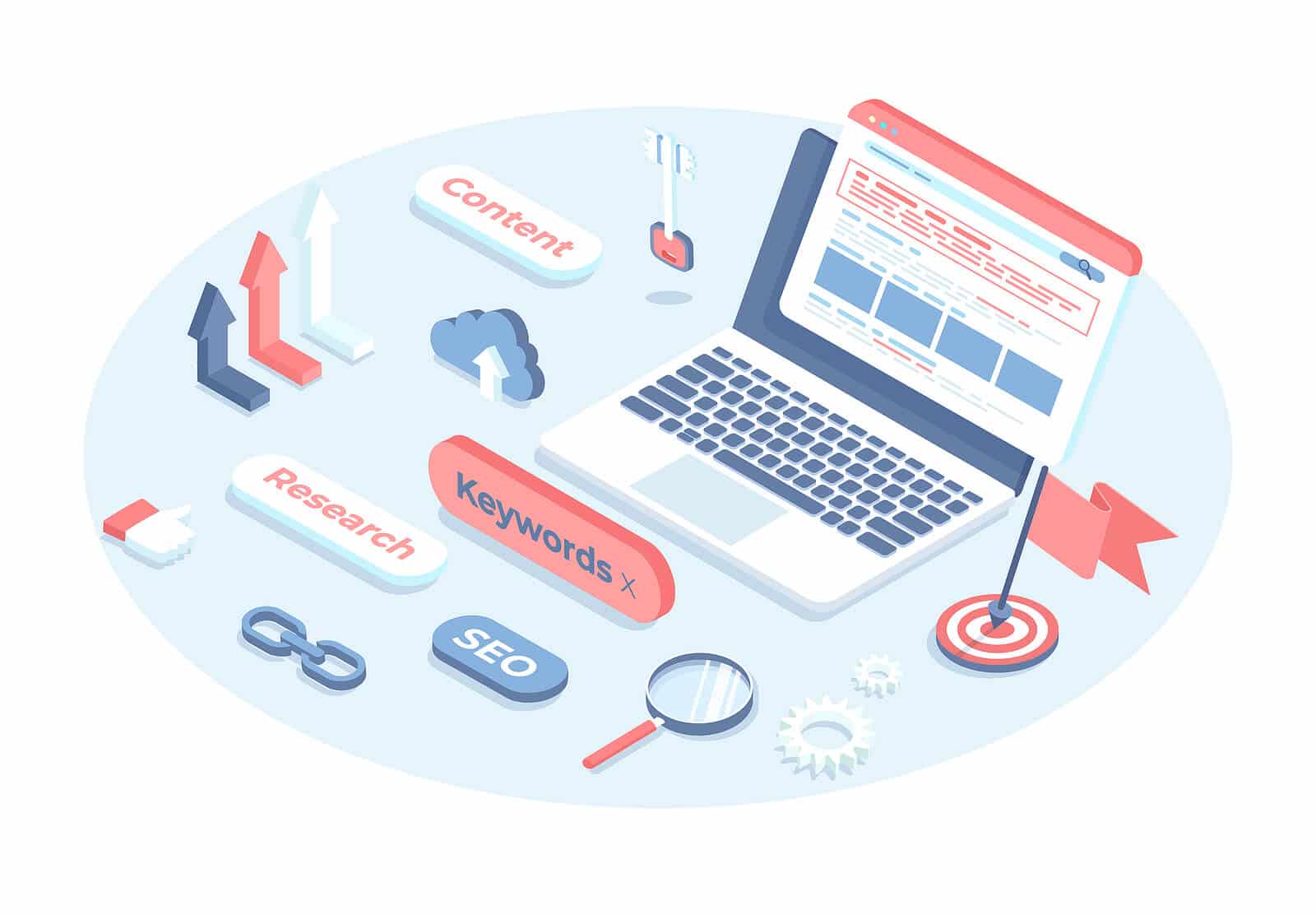In the rapidly evolving world of digital marketing, SEO (Search Engine Optimization) and storytelling have emerged as two pillars of successful brand promotion. While SEO helps improve a website’s visibility on search engines, storytelling captivates audiences. It engages them emotionally and helps build relationships between your brand and its customers.
So, what happens when we combine the power of SEO with effective storytelling? The answer is simple – there is potential to create compelling narratives that will help your website gain higher search rankings. This can be particularly beneficial for therapists. Since there is a great deal of competition in the therapeutic space, having an effective SEO-storytelling strategy can help therapists stand out from the crowd and rank high on search engine results pages.
This blog will delve deep into how the principles of Storybrand can be used to enhance SEO efforts, leading to improved Google rankings for therapists.
The Foundation of Storybrand
Storybrand is a framework that was created by Donald Miller. It utilizes the power of storytelling to create compelling brand narratives. The framework contains the components of character, problem, guide, plan, call to action and success. Let’s take a closer look at these core components of Storybrand and see how they can be used to improve SEO rankings for therapists on Google.
Character: The Hero
The first component in the Storybrand framework is the character or hero, which in this case would represent your client. The character is often depicted as someone who is struggling with a problem. But by the end of their journey, they have found a solution and experienced success. So, they are the hero of the story.
When using SEO with a storybrand approach, therapists can utilize the narrative that their client is the hero of the story. This helps to captivate and engage their target audience. Which can lead to longer web visits, more page views, and higher rankings on search engines.
Problem: The Conflict
The next component of Storybrand is the problem or conflict that the character faces. You could even paint the problem as a villian the character must defeat. This helps to create a sense of urgency and helps the audience feel seen. But also they feel the need to act and overcome the problem. This can represent any struggles, challenges, or obstacles that your client may encounter on their therapeutic journey.
For example, it could be anything from struggling with anxiety and depression to relationship issues. By recognizing and acknowledging the problem, the potential client can more easily relate to the story and see how therapy could help them. This can benefit your SEO as a therapist. You can craft compelling stories that target keywords relevant to your therapeutic practice and use them to rank higher on Google.
Guide: The Mentor
This is the part where you come into the story. As the therapist, you serve as the guide who helps the character along their journey. Showing them that there is a better solution to their problem and helping them find it. You are the mentor of the story, providing support and insight into how they can make positive changes in their lives for long-term success.
This role plays into SEO as well. Through your stories, you can demonstrate that you are an expert in the field of therapy and can provide valuable guidance to potential clients. This helps to create trust and build credibility with search engines, which can lead to higher rankings on Google. It shows Google you’re an expert on the topic and that you are a reliable source of information. But also does this in an emotion-driven way that resonates with potential clients.
Plan: The Action Plan
As your role as the guide in this story, you can provide the character with a plan. This could be anything from creating a roadmap for recovery to offering advice on how to make positive changes in their life. The plan should address the problem and offer solutions that will lead to success.
With an effective SEO and storybrand strategy, you can use this concept to craft stories that target keywords relevant to your therapeutic practice. This story will not only help boost your rankings on Google but will also help to engage and captivate potential clients. It shows them that you have the knowledge, expertise, and experience to help them make positive changes in their life.
Call To Action: The Invitation
Once they have the plan, it’s time to invite them to take action. This is where the potential client, or also known as the hero of this story, has decided to trust in the mentor and take their advice. This is where you can call for them to act on your plan by inviting them to contact you through email, book a session, or follow your social media accounts.
For SEO purposes, this is where you have a call to action that links to your website and tells your hero to click and learn more. It also tells them how to progress their journey with you, which can help to draw in potential clients. You can also use this to track the results of your storybrand and SEO efforts by tracking conversions from the call to action. This metrics will show you how effective your stories are in engaging potential clients and where you need to make improvements.
Success: The Achievement
For the finale of this story, it’s important to demonstrate the success of your hero. This could be anything from overcoming their problem and achieving a better life or finding a solution to their issue. It should show that they have found success through the guidance of yourself as the mentor and that you were able to help them achieve their goals.
For SEO purposes, this is where you can highlight the success of your hero. This can look like customer reviews, or testimonials from clients who have experienced success from your help. This can help to boost your credibility with not only potential clients but also with search engines. It shows them that you are an expert in the field and that your brand can offer valuable results for those who choose to work with you.
Staying Ahead in Therapist SEO
The world of Search Engine Optimization (SEO) is ever-evolving. Google’s algorithms, the complex systems used to retrieve data from its search index and instantly deliver the best possible results for a query, are continually updated. This is where the importance of an adaptive SEO strategy comes in.
Adapting an SEO strategy isn’t a one-and-done task. It is a continuous process. One that you have to keep testing, tracking, and adjusting. You have to learn and understand how search engines like Google work. But more importantly, how they’re constantly changing. This involves staying up-to-date with the latest SEO news and Google updates. It also means testing out different SEO techniques, and constantly adjusting your SEO strategy based on the results. For example, trying out storybrand as a new SEO strategy to help boost your rankings and draw in potential clients.
For Therapists, This Could Involve Experimenting.
Not only with different keywords but also with on-page optimization techniques, or backlink strategies. This can help you see what works best for helping your website and pages rank on Google. Using tools like Google Analytics can provide valuable insights into how well your SEO efforts are performing and where improvements can be made.
However, while SEO is critical, it’s also important not to lose sight of the potential client and their journey. Remember, your end goal isn’t just to rank high on Google, but to attract and engage potential clients. Combining the Storybrand framework with a dynamic SEO strategy, you can ensure that you’re not just reaching your target audience but also connecting with them in a meaningful way. Which leads to higher conversion rates and client satisfaction.
Merging SEO and StoryBrand: A Powerful Combination for Therapists
The relationship that SEO and Storybrand share is a powerful one. By merging these two approaches, you can create content that not only resonates with your potential clients but show Google that you’re an expert in the field. This can be achieved by taking components of SEO like keywords and content creation and aligning them with the characters, problems, and solutions presented in your story.
Selecting Your Keywords
When thinking about and creating your Storybrand narrative, think about what your potential clients are facing and what keywords they may be using when searching for help. Consider what solutions would be best for them and how you, as the guide in this story, can help. Then align your keywords you are targeting with the story. This can help you create a narrative that is both meaningful to potential clients and search engine friendly.
Creating Your Content
The goal of Storybrand is creating a story that is engaging and value-driven. One that your potential clients can see themselves in and learn from. Your story should address their problem and how you can help. It should also be clear, concise, and easy to comprehend.
By creating content that is both search engine friendly and flows with the narrative of your story, it will make it easier for potential clients to follow. But it will also be more likely to show up in search results. Additionally, focusing on high-value keywords within your content can help to boost your SEO by enticing potential clients to click on the link.
Include On-Page Optimization
The narrative doesn’t stop at the content on the page. To maximize your SEO efforts, you need to ensure that all elements of your website are optimized for search engines. This can include meta titles and descriptions, headers, image captions, and more. Injecting storytelling elements into these components can help make them more meaningful and search engine friendly.
Each page should tell a part of your story, guiding potential clients through their journey and encouraging them to take the next step. For example, meta titles and descriptions should address the problem, solutions, and how you can help. Headers should be structured to flow with the narrative instead of merely listing topics. This ensures that your potential clients understand what they are reading about and how it relates to them.
Gain Backlinks
Backlinks are gold when it comes to therapist SEO. They are a powerful tool for driving more traffic to your website and boosting your rankings on search engine results pages (SERPs). To gain backlinks, you’ll need to create content that is shareable and resonates with people. And since storytelling can be an incredibly powerful way of engaging potential clients, it makes sense to leverage the Storybrand framework.
If a client or colleague reads your content and finds it particularly helpful or interesting, they may share it with their own networks. This would give you a backlink. Or otherwise known as a link from another website that links to yours. Storybrand can help make this process easier by creating content that resonates with potential clients or colleagues who might be willing to link to your website.
Think About User Experience
One of the main points of the Storybrand framework is creating a cohesive experience for the reader. This means that it isn’t just about crafting great content, but ensuring that each page provides value to the user’s journey. Your therapy website may do well with just implementing SEO, but Storybrand can help take your website to the next level.
Potential clients want to feel like they are being heard, which is why it’s so important for therapists to prioritize their experience when designing and optimizing their website. This could involve ensuring the website is easy to navigate, or adding visuals that tell a story. It can also include breaking up large chunks of text with images or videos. All these elements help create a cohesive narrative experience for potential clients as they click through your webpages which keeps them engaged and interested in what you have to offer.
Don’t Ignore Technical SEO
What happens when a movie buffers or the story ends on a cliffhanger? Most people don’t stick around to watch it. The same goes for your website pages. If the user experience is hindered by technical issues, potential clients are likely to leave and not come back anytime soon.
Technical SEO helps ensure that visitors have a smooth and uninterrupted experience when visiting your website pages. This could involve making sure your page loads quickly, that there are no broken links, or other technical issues can detract from the story you’re trying to tell. Because it can negatively impact your SEO ranking but also disrupt the user experience. Checkin in on your technical SEO on a regular basis to make sure your website is running as it should.
Therapist SEO Takes Time and Dedication.
As with any story collection or on going series, therapist SEO takes work and dedication. It also takes time. Making SEO a long-term strategy and journey that can help ensure that you continuously make progress towards gaining more website traffic and potential clients. Yet it might take some time before you start seeing results.
However, by utilizing SEO and Storybrand together, you can create a strategy that is both meaningful and engaging to potential clients. This could help to boost your website rankings, engagement rates, and even backlinks. And most importantly, it will help ensure that the story you tell resonates with those who need it the most.
We Can Help You Write Your Narrative With SEO and Storybrand!
At Simplified SEO Consulting, we understand the power of storytelling and SEO. So, if you’re struggling to create a narrative-driven therapy website that is SEO friendly, we can help. Our team of experts will work with you to craft an SEO strategy and content that capitalizes on the Storybrand framework. We believe storytelling is one of the most powerful ways to engage potential clients and build trust. No matter if you’re a beginner or already have a well-optimized website but require help with content creation, we have the ideal solution for you. By investing in your website, you’re investing in the future of your practice. Curious about SEO and want to learn for yourself? Sign up for our SEO Course for Therapists and learn how to use the power of content and SEO to reach more clients and grow your practice! Or want to outsource it? Check out our SEO Consulting packages and schedule your consult today! Ready to get started?
Other SEO Services At Simplified SEO Consulting
If you feel as if you are already an expert in SEO but want to see what other services we offer, know that we also provide other services. We offer options such as our 12-week training, small group intensives, and courses. Our strategy sessioncan be a great option if you need support getting started with SEO or doing a site move or redesign. These can also be helpful to find better keywords, evaluating your current SEO performance, and more. Or, if you’re ready to work with a passionate and skilled team, our Done for You Program may be a great following approach.
About the Author
Meet Lynsey, the passionate SEO Content Specialist at Simplified SEO Consulting, dedicated to assisting therapists in excelling with local SEO. With a specialization in mental health topics, Lynsey creates compelling content that embodies her clients’ brand voices and attracts ideal clients to their private practices. Her expertise in copywriting empowers therapists to maximize their ROI through effective SEO marketing and storytelling, with a focus on leveraging the power of blogs. If you’re a therapist aiming to enhance your online presence and attract clients, Lynsey and the Simplified team are ready to help. Discover the benefits of SEO and Storybrand for your practice and schedule a consultation to see how Simplified can serve you!
 Some may involve making technical changes to your site. Others may require you to change how you conduct your SEO strategy or go about creating content such as blogs. Local SEO is one avenue that can have many benefits for your practice. But, it may take some getting used to in order to get the most out of it. Today, we are going to be discussing if working to improve your Local SEO is worth the time, and offer tips on how you might be able to do so.
Some may involve making technical changes to your site. Others may require you to change how you conduct your SEO strategy or go about creating content such as blogs. Local SEO is one avenue that can have many benefits for your practice. But, it may take some getting used to in order to get the most out of it. Today, we are going to be discussing if working to improve your Local SEO is worth the time, and offer tips on how you might be able to do so.  Anyone interested in improving their local rankings can benefit from local SEO. But, depending on the nature of your practice, it may or may not be worth the time and effort put into improving your local SEO presence.
Anyone interested in improving their local rankings can benefit from local SEO. But, depending on the nature of your practice, it may or may not be worth the time and effort put into improving your local SEO presence.  There are a number of different ways one can go about improving their local SEO. One of the first things to check is ensuring that all your practice information is accurate. This can be the easiest step for many, but ensuring that this info is updated when changes occur can be tricky. This is especially true when your practice info is present on more than one source on the internet. Another impactful step can be building high-quality backlinks over time. Doing so can help improve the authority of your site with Google, and improve the visibility of your site.
There are a number of different ways one can go about improving their local SEO. One of the first things to check is ensuring that all your practice information is accurate. This can be the easiest step for many, but ensuring that this info is updated when changes occur can be tricky. This is especially true when your practice info is present on more than one source on the internet. Another impactful step can be building high-quality backlinks over time. Doing so can help improve the authority of your site with Google, and improve the visibility of your site.












 In the vast and ever-evolving realm of digital marketing, SEO (
In the vast and ever-evolving realm of digital marketing, SEO ( On-Page SEO Vocabulary
On-Page SEO Vocabulary
 NAP (Name, Address, Phone Number): Basic business information like hours, locations, addresses, etc. that must be consistent and accurate across various online platforms, directories, and websites
NAP (Name, Address, Phone Number): Basic business information like hours, locations, addresses, etc. that must be consistent and accurate across various online platforms, directories, and websites
 Classifying Your Site Audit Results
Classifying Your Site Audit Results While knowing the cause of each issue is invaluable, it still may not be worth the time to go through and fix every single warning, error, and critical error on the site. There are many different unique warnings and errors that may occur on your site, so we won’t be addressing every issue in this post. Each concern has a description of why the error/warning is occurring, so making use of that resource will be important when reviewing your site audit.
While knowing the cause of each issue is invaluable, it still may not be worth the time to go through and fix every single warning, error, and critical error on the site. There are many different unique warnings and errors that may occur on your site, so we won’t be addressing every issue in this post. Each concern has a description of why the error/warning is occurring, so making use of that resource will be important when reviewing your site audit.  In short, it’s not that simple. As a general rule, yes it will be best to fix all critical errors that occur on your site audit. But, there are also some errors that may need to be addressed like broken resources. In the end, it is worth taking your personal situation into account so you can effectively use your time to address the issues that affect your site most.
In short, it’s not that simple. As a general rule, yes it will be best to fix all critical errors that occur on your site audit. But, there are also some errors that may need to be addressed like broken resources. In the end, it is worth taking your personal situation into account so you can effectively use your time to address the issues that affect your site most. 








